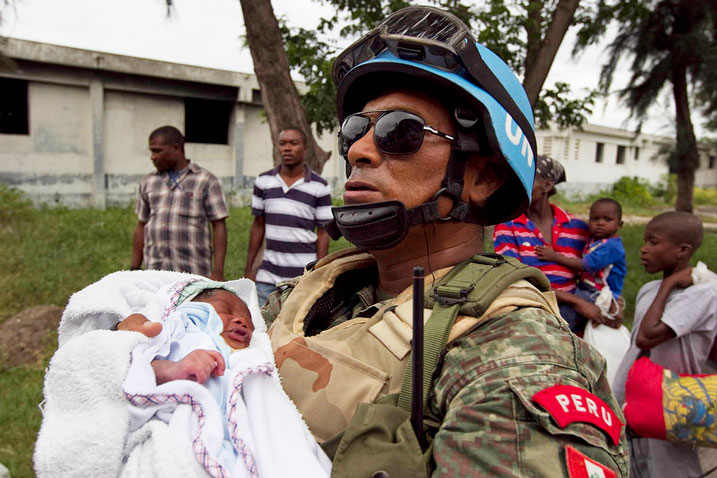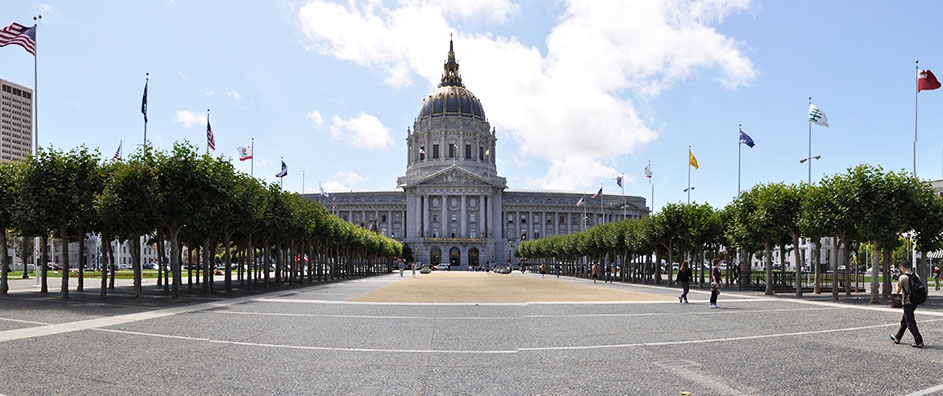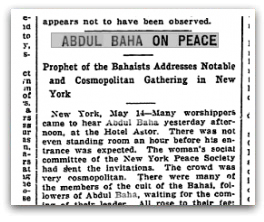The views expressed in our content reflect individual perspectives and do not represent the authoritative views of the Baha'i Faith.
If you ever get the chance to take a walk through the wonderful city of San Francisco, you might want to stop by the place where world government got its start. Appropriately enough, it’s right across from the Civic Center.
In the spring of 1945, the initial framework for the United Nations began to be constructed as soon as World War II looked like it would produce an Allied victory for the United States, England and Russia over the Axis powers of Germany, Italy and Japan. As World War II wound down, the United Nations Conference on International Organization, or UNCIO, hosted delegates from fifty Allied nations in San Francisco. Now called UN Plaza, the delegates meeting there during that foggy spring season all took part in reviewing and then rewriting the Dumbarton Oaks Agreements, part of a process set in motion by the Allied leadership early in the war with meetings in Cairo, Tehran, Moscow and finally Yalta and Potsdam. At the Dumbarton Oaks conference, held in Washington, DC, high-level delegations from China, the Soviet Union, the United Kingdom, and the United States first agreed on the framework for the establishment of an organization to maintain peace and security in the world.
Designed to replace the League of Nations, that initial failed attempt at a worldwide intergovernmental body, the UN Charter first opened for signatures from the world’s governments on the day the San Francisco UNCIO conference wrapped up — June 26, 1945. Five months later the Charter, with 51 nations on board, formally established the United Nations on October 24, 1945.
Amazingly, the Baha’i teachings had long foreseen these striking, world-embracing developments. When the UNCIO delegates met in 1945, few realized that Abdu’l-Baha had prophetically declared in San Francisco, a third of a century before, “May the first flag of international peace be upraised in this state.” And when the cornerstone of the United Nations’ permanent seat was laid in New York City in 1949, the Baha’is recalled Abdu’l-Baha’s visionary statement thirty-seven years earlier, declaring New York as the “City of the Covenant” and saying, in an address at the Astor Hotel to the New York Peace Society:
There is no doubt that … the banner of international agreement will be unfurled here to spread onward and outward among all the nations of the world. – The Promulgation of Universal Peace, p. 125.
This new birth of hope for world peace, security and cooperation resulted, as the Baha’i writings had foreseen, from the “fiery ordeal” of World War II — which had finally succeeded in “implanting that sense of responsibility” which leaders earlier in the century had sought to avoid. The global fear induced by the invention and first use of nuclear weapons evoked Abdu’l-Baha’s prescient predictions in North America that ultimately peace would come because the nations would be driven to accept it.
Baha’is understand that the United Nations is far from perfect, and will require significant further evolution before it can match Baha’u’llah’s great vision of a unified world governing body. Since the establishment of the UN the world has seen many regional wars and conflicts — but the devastating specter of worldwide war has also been successfully averted for almost seven decades. In a world bristling with more and more deadly armaments than ever before, that accomplishment should make all humanity grateful.
 Even today, though, few people truly understand everything the United Nations does. Financed by assessed and voluntary contributions from all of its member states, the UN maintains international peace and security in war and conflict zones, promotes and protects human rights, fosters social and economic development in the world’s developing nations, protects the environment through the UN Environmental Programme, and provides massive humanitarian aid in cases of famine, natural disaster, and armed conflict.
Even today, though, few people truly understand everything the United Nations does. Financed by assessed and voluntary contributions from all of its member states, the UN maintains international peace and security in war and conflict zones, promotes and protects human rights, fosters social and economic development in the world’s developing nations, protects the environment through the UN Environmental Programme, and provides massive humanitarian aid in cases of famine, natural disaster, and armed conflict.
So try to imagine, if you will, while taking your stroll through UN Plaza in San Francisco, a world without the United Nations. With our shrinking planet’s growing economic, resource and environmental interdependence, we would need to quickly invent an international body if we didn’t already have one.
The United Nations has had its share of criticism during its two-thirds of a century – that it is overly bureaucratic, that it is ineffective in some areas of world conflict and peacekeeping, and that the undemocratic veto power of the Security Council nations causes unnecessary stasis and policy gridlock. But despite its drawbacks and structural limitations, the United Nations has accomplished something the world has never before witnessed: a working intergovernmental body that can sometimes transcend the outmoded, war-inducing model of national sovereignty so detrimental to humanity.

















Comments
Sign in or create an account
Continue with Googleor